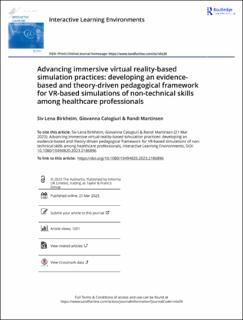| dc.contributor.author | Birkheim, Siv Lena | |
| dc.contributor.author | Calogiuri, Giovanna | |
| dc.contributor.author | Martinsen, Randi | |
| dc.date.accessioned | 2023-10-24T07:55:01Z | |
| dc.date.available | 2023-10-24T07:55:01Z | |
| dc.date.created | 2023-03-23T14:03:32Z | |
| dc.date.issued | 2023 | |
| dc.identifier.citation | Interactive Learning Environments. 2023, . | en_US |
| dc.identifier.issn | 1049-4820 | |
| dc.identifier.uri | https://hdl.handle.net/11250/3098236 | |
| dc.description.abstract | ABSTRACT Virtual reality (VR) based simulation is emerging as an innovative tool for the training and education of healthcare professionals. However, pedagogical frameworks specific to this type of simulation are yet missing. This paper explores participants’ experiences with VR-based simulation training in non-technical skills (VR-SIMI) and integrates them with established pedagogical theory. Non-technical skills refer to cognitive, social, and personal resource skills such as effective communication, relational competence, and stress management. An observational study was conducted involving 11 health care professionals in children and adolescents’ mental health who attended four VR-SIMI sessions over one year. Data were collected through field notes during participant observation and informal conversations with the participants. Directed content analysis was conducted, informed by the established practice of VR-SIMI (including INACL standards of best practice simulation), Jeffries simulation theory, Kolb’s experiential learning theory, and adult learning theory. The findings indicate that the participants positively evaluated the use of VR-SIMI. However, they also reported that the implementation and learning outcomes should be further refined. Based on these findings, an evidence-based and theory-driven pedagogical framework is proposed to guide andenhance the quality of VR-based simulations of non-technical skills for various of healthcare professionals, as well as inform future research. © 2023 The Author(s). Published by Informa UK Limited, trading as Taylor & Francis Group. This is an Open Access article distributed under the terms of the Creative Commons Attribution License (http://creativecommons.org/licenses/by/4.0/), which permits unrestricted use, distribution, and reproduction in any medium, provided the original work is properly cited. The terms on which this article has been published allow the posting of the Accepted Manuscript in a repository by the author(s) or with their consent. | |
| dc.description.abstract | Advancing immersive virtual reality-based simulation practices: developing an evidence-based and theory-driven pedagogical framework for VR-based simulations of non-technical skills among healthcare professionals | |
| dc.language.iso | eng | en_US |
| dc.relation.uri | https://www.tandfonline.com/doi/epdf/10.1080/10494820.2023.2186896?needAccess=true | |
| dc.rights | Navngivelse 4.0 Internasjonal | * |
| dc.rights.uri | http://creativecommons.org/licenses/by/4.0/deed.no | * |
| dc.title | Advancing immersive virtual reality-based simulation practices: developing an evidence-based and theory-driven pedagogical framework for VR-based simulations of non-technical skills among healthcare professionals | en_US |
| dc.title.alternative | Advancing immersive virtual reality-based simulation practices: developing an evidence-based and theory-driven pedagogical framework for VR-based simulations of non-technical skills among healthcare professionals | en_US |
| dc.type | Peer reviewed | en_US |
| dc.type | Journal article | en_US |
| dc.description.version | publishedVersion | |
| dc.source.pagenumber | 13 | en_US |
| dc.source.journal | Interactive Learning Environments | en_US |
| dc.identifier.doi | 10.1080/10494820.2023.2186896 | |
| dc.identifier.cristin | 2136467 | |
| cristin.ispublished | true | |
| cristin.fulltext | original | |
| cristin.qualitycode | 1 | |

